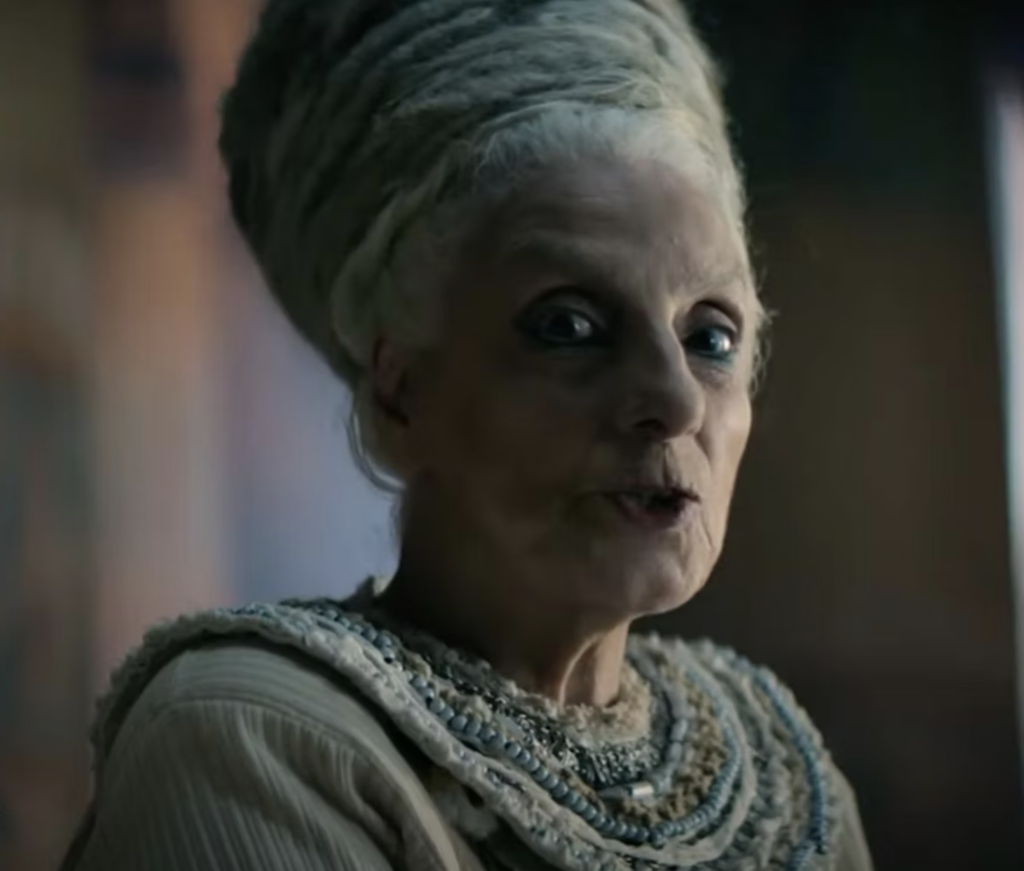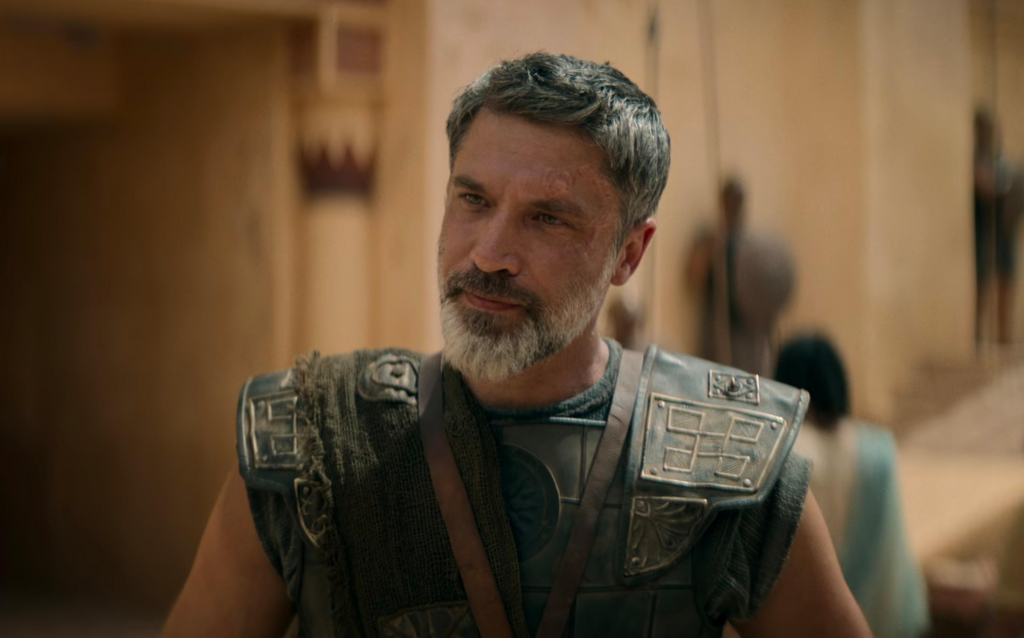Review of “Alexander: The Making of a God”
Netflix recently released season 1 of a docuseries called “Alexander: The Making of a God” that I’ve been excited to watch, especially given that I’ve been working on a digital hex-and-counter game about Alexander the Great called Arete for the past three years. It seemed like this would be a perfect way for me to “check my work” and compare notes. Alas, while I want the powers that be to make more history documentaries, some inaccuracies in this one have marred the experience a bit for me. Here are a few and feel free to correct me if I’m wrong on any of these:
Philip with two eyes instead of missing one, and being reduced to “angry dad” character. Somehow, Philip is still portrayed in film as either bumbling or as someone who doesn’t get it, despite innovations like: modifying the phalanx, modifying the sarissa, and creating the League of Corinth to give Greeks the feeling of agency and to avoid having to micro-manage them. While he and Alexander did have a falling out, he’s shown here as a one-dimensional parental villain with no additional context given. Philip built the foundation and you could make an argument for Philip having “the Great” in his name. They missed an opportunity to at least touch on Philip’s accomplishments and what Alexander was inheriting.

Granicus battle scene. No phalanx or sarissas whatsoever. The Persians who participated (not the Greek mercenaries in back) may have been all cavalry, but the Macedonians were not. I don’t understand how you leave out two of the main innovations contributing to Macedonian success and dumb it down to clichéd sword fighting. Making it worse, almost everyone on a horse immediately jumps off of them into the river to fight with their swords. So the horses just served as what, ancient Ubers to the battlefield?
Parmenion portrayed as conspiring against Alexander the entire time. While it’s true Parmenion was part of Philip’s (old) guard and Arrian makes him out to be an overly safe contrast to Alexander’s boldness, he was still Alexander’s strategos (highest ranking general) and trusted enough to lead the entire left wing in battle. Yes, later his son Philotas is accused of conspiring against Alexander, but whether he actually did is unknown. Furthermore, it doesn’t implicate his father in such a scheme, never mind making it seem as if he did so all along. Alexander’s men did grumble about his adopting Persian customs, but A:TMOAG wrongly asserts that Parmenion led this complaining from as early as Egypt (it happened much later) and then parlayed it into a mutiny.

Issus battle scene. First off, where’s the river? By all accounts the two armies faced each other across the Pinarus River. There’s doubt whether it’s the modern day Deliçay or Payas, but Netflix settles this debate by removing the river altogether. Out of sight, out of mind. Then the battle scene where, OK we finally get our phalanx and sarissas. It’s a meager scattered lot but I don’t expect a docuseries to have a budget for multiple formations of 16 rows of 16 men, so I’ll let them off the hook for that. What I won’t let slide, however, is how they all charge randomly and at differing speeds once the battle commences. It’s no longer a phalanx formation at all, looking more like a middle school game of dodgeball where they’re all racing for that line of red rubber gym balls sitting at half-court. Seriously, they had at least a half dozen historians commenting between the cinematic segments and not one of them said, “You know the formations were kiiiiiind of an important factor in these battles”?
Post-Issus battle. All accounts say Alexander chased Darius until night fall, but this is skipped entirely so we can get to Stateira holding a dagger to Alexander’s chest (I haven’t seen this mentioned anywhere) and mistaking Hephaestion for the Macedonian king. She is there with one of her daughters, but sources say we should also be seeing two of his daughters as well as Darius’ mother, Sisygambis, who is really the one that mistakes Hephaestion for Alexander. Along with them should be the wives of several satraps as well. But actors cost money I guess (Thanks Obama!).
Alex getting it on with Darius’ wife, Stateira. OK, this may or may not have actually happened but the documentary definitively puts a stake in the ground that it did and gives us a whole invented love scene between them. It follows that with a scene that’s straight out of Real World: Babylon where Darius is told, “He’s been treating her like his queen,” and Darius raging. A full one episode later does a historian finally tell us that Stateira died in child birth TWO YEARS LATER with a child that could have been Alexander’s, but no one really knows.

But wait, there’s more. Later, Alexander is sending a letter to Darius in which he’s rejecting Darius’ latest offer to split the kingdom and his daughter’s hand in marriage. Alexander is going to reject his offer but has decided to take Darius’ daughter on as another of his wives, which happened as mostly a political move…and to show that he can do it whether Darius offers or not, and this marriage happened ten years later. But then we get a scene where Hephaestion basically says, “Hey, she’s already betrothed to Mazaeus, so why don’t you put that in the reply letter too and send it in care of Mazaeus,” supposedly to show Darius is willing to betray his men. If you find evidence of this scene anywhere in our reality, please email it to me.

About Alexander and Hephaestion. This one isn’t a mistake as I have no problem with Netflix leaning into their being lovers. At the very least Hephaestion was Alexander’s closest friend since childhood and he was devastated when he died. We have no evidence that they were indeed lovers, but given the societal norms we know of Ancient Greece it’s very possible they were. But it’s not a given as it was presented, and I wish the historians better addressed this after that opening scene and to give viewers more background around those societal norms of Ancient Greece. To me, it’s far more fascinating to try to understand how different their view of sexuality and labels were than the ones so far removed that we live under today.
I’ve got one episode left to watch in this series and it pains me that Netflix took the time to make something that looks pretty good, but can’t be bothered with accuracy. If you follow me on social media you know that I enjoyed Ridley Scott’s “Napoleon” and I thought the criticisms were nitpicky and unfair to the point of being silly (“It looked like too many soldiers went under the ice!”), especially since most of those same complainers have no problem with wildly inaccurate movies like “Braveheart.” But that was a movie, and this is a docuseries, so these inaccuracies bother me a whole lot more than Napoleon firing his cannon at a pyramid in a movie.
Apart from these inaccuracies, the series has been interesting to watch. The acting has been better than expected and visually they did a pretty good job representing ancient cities and regions. However there were also many opportunities to go into detail about the battles, the weapons and armor, the relationships, and so many other specifics that are inexplicably omitted. Why was Alexander great? What tactics and innovations did he use? Etc. The historians were a huge disappointment in this respect because I kept wanting them to elaborate on specifics, but instead their contributions were just empty fluff. I’m sure these people know their history, but all we saw were lame superlatives that sounded like kids padding their book report.
I believe historians and wargamers should make it a point to watch all new historical movies and documentaries so that we get more of them. Sadly though, this one gets a C- from me so far because of the inaccuracies and the fluff. It’s still worth a watch and I’ll watch season 2 when that comes out, but I’m still craving an undiluted Alexander documentary made with more wine and less water.

Leave a Reply